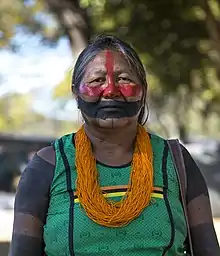Tuíre Kayapó
Tuíre Kayapó, also called Tuíra (born 1969/1970),[1] is a Brazilian indigenous rights activist, environmentalist, and a chief of the Kayapó people. She was active in the movement against the Bela Monte Dam project on the Xingu River in the 1980s and constitutional amendment PEC 215 in the 2010s.[2][3]

Early life
Tuíre's father was born in the village of Kubēnkrãkêj. He met her mother in her home village of Kokrajmoro, which is also where Tuíre was born.[4] Her grandmother named her.[4] Growing up, Tuíre's grandfathers and uncle were Kayapó leaders who defended their lands against government incursions.[2][4][3] Her paternal grandfather, Betikré, died during one of these conflicts.[4] From a young age, her family encouraged her to also become a warrior and to defend her people.[4]
At age 17, Tuíre and her family moved back to her father's village, Kubēnkrãkêj.[4] Her parents died shortly afterwards. Tuíre and her infant son moved to the village of Aukre, where she met her husband, Takaktô, from the village of Gorotire. They married soon afterwards.[4]
Activism
In 1989, at age 19,[1] Tuíre attended a meeting in Altamira, Pará with officials from the Bela Monte Dam. She brandished her machete in the face of an Eletronorte official in protest of the dam's construction.[5] The photo taken of the event brought her name into the public consciousness.[1][2][4] By the 1990s, Tuire began travelling abroad, including to the United States, to spread awareness of her people's political struggles.[6]
Tuíre took her uncle's place when he died, and faced little resistance from her community, although she is one of the first women chiefs of the group.[2][3][7]
She has gone to Congress to speak on behalf of the Kayapo and other indigenous groups.[7] She chooses to speak in Mebêngôkre during these events, and has an interpreter translate for her.[8]
In 2020, Turkish artist and photographer Pinar Yolaçan released a film about Tuíre's life, entitled Tuire Kayapó (First Contact).[7] Yolaçan and Tuíre had first met during a residency Yolaçan had in Bolivia in the late 2010s.[7]
Personal life
She lives in and is chief of the village of Kaprãnkrere,[3] in Terra Indígena Las Casas, Pará.[8][4] She has a husband, Takaktô, as well as children and grandchildren.[4]
She is the sister of activist Paulinho Paiakan and the aunt of aspiring politician Maial Panhpunu Paiakan.[9]
References
- "PA - Território Kayapó sofre com expressivo processo de contaminação, desmatamento, destruição e garimpo ilegal". Mapa de Conflitos Envolvendo Injustiça Ambiental e Saúde no Brasil (in Brazilian Portuguese). Retrieved 2023-07-27.
- Yolaçan, Pinar (2017-06-13). "Kayapó Chief Tuire". BOMB Magazine. Retrieved 2023-07-27.
- Jansen, Charlotte (2017-06-15). "'This Is My Land': The Indigenous Women Chiefs Protecting the Amazon". Vice. Retrieved 2023-07-27.
- gabi (2019-02-08). "Multiplicidade encarnada". Escola de Ativismo (in Brazilian Portuguese). Retrieved 2023-07-27.
- "Indians confront Amazon dam officials". Kainai News. March 15, 1989. p. 2. Retrieved July 26, 2023.
- Brown, Michael F. (1993). "Facing the State, Facing the World: Amazonia's Native Leaders and the New Politics of Identity". L'Homme. 33 (126/128): 307. ISSN 0439-4216 – via JSTOR.
- Pender, Danielle. "Tuire Kayapo". Riposte. Retrieved 2023-07-27.
- Ávila, Cristina (September 14, 2021). "Indigenous women protest for their rights". www.wwf.org.br (in Portuguese). Retrieved 2023-07-27.
- "Kayapó chief Tuire interview with artist Pinar Yolaçan". Lampoon. October 20, 2022. Retrieved July 26, 2023.